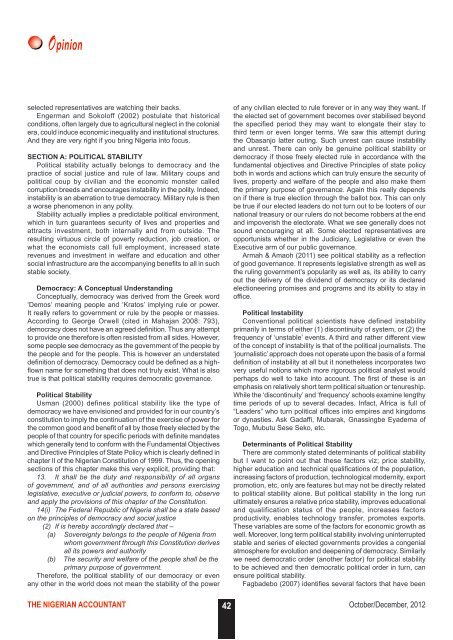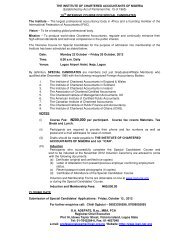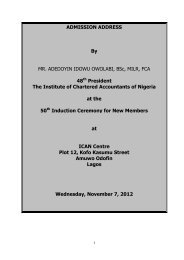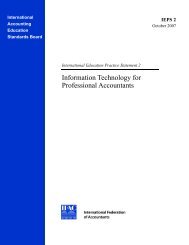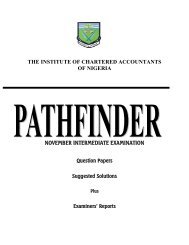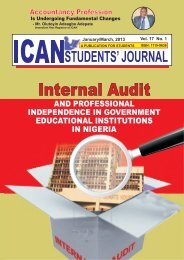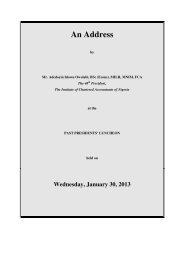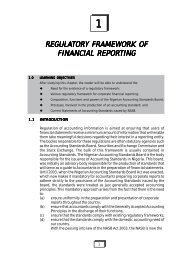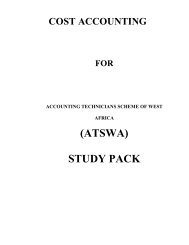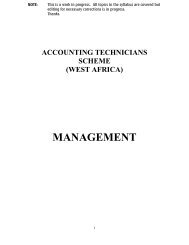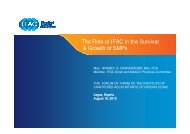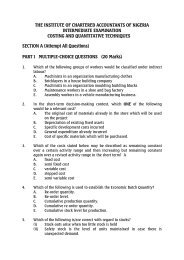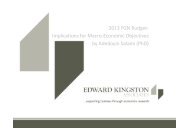The Nigerian Accountant 2012 October/December Edition
The Nigerian Accountant 2012 October/December Edition
The Nigerian Accountant 2012 October/December Edition
You also want an ePaper? Increase the reach of your titles
YUMPU automatically turns print PDFs into web optimized ePapers that Google loves.
Opinionselected representatives are watching their backs.Engerman and Sokoloff (2002) postulate that historicalconditions, often largely due to agricultural neglect in the colonialera, could induce economic inequality and institutional structures.And they are very right if you bring Nigeria into focus.SECTION A: POLITICAL STABILITYPolitical stability actually belongs to democracy and thepractice of social justice and rule of law. Military coups andpolitical coup by civilian and the economic monster calledcorruption breeds and encourages instability in the polity. Indeed,instability is an aberration to true democracy. Military rule is thena worse phenomenon in any polity.Stability actually implies a predictable political environment,which in turn guarantees security of lives and properties andattracts investment, both internally and from outside. <strong>The</strong>resulting virtuous circle of poverty reduction, job creation, orwhat the economists call full employment, increased staterevenues and investment in welfare and education and othersocial infrastructure are the accompanying benefits to all in suchstable society.Democracy: A Conceptual UnderstandingConceptually, democracy was derived from the Greek word‘Demos’ meaning people and ‘Kratos’ implying rule or power.It really refers to government or rule by the people or masses.According to George Orwell (cited in Mahajan 2008: 793),democracy does not have an agreed definition. Thus any attemptto provide one therefore is often resisted from all sides. However,some people see democracy as the government of the people bythe people and for the people. This is however an understateddefinition of democracy. Democracy could be defined as a highflownname for something that does not truly exist. What is alsotrue is that political stability requires democratic governance.Political StabilityUsman (2000) defines political stability like the type ofdemocracy we have envisioned and provided for in our country’sconstitution to imply the continuation of the exercise of power forthe common good and benefit of all by those freely elected by thepeople of that country for specific periods with definite mandateswhich generally tend to conform with the Fundamental Objectivesand Directive Principles of State Policy which is clearly defined inchapter II of the <strong>Nigerian</strong> Constitution of 1999. Thus, the openingsections of this chapter make this very explicit, providing that:13. It shall be the duty and responsibility of all organsof government, and of all authorities and persons exercisinglegislative, executive or judicial powers, to conform to, observeand apply the provisions of this chapter of the Constitution.14(i) <strong>The</strong> Federal Republic of Nigeria shall be a state basedon the principles of democracy and social justice(2) If is hereby accordingly declared that –(a) Sovereignty belongs to the people of Nigeria fromwhom government through this Constitution derives(b)all its powers and authority<strong>The</strong> security and welfare of the people shall be theprimary purpose of government.<strong>The</strong>refore, the political stability of our democracy or evenany other in the world does not mean the stability of the powerof any civilian elected to rule forever or in any way they want. Ifthe elected set of government becomes over stabilised beyondthe specified period they may want to elongate their stay tothird term or even longer terms. We saw this attempt duringthe Obasanjo latter outing. Such unrest can cause instabilityand unrest. <strong>The</strong>re can only be genuine political stability ordemocracy if those freely elected rule in accordance with thefundamental objectives and Directive Principles of state policyboth in words and actions which can truly ensure the security oflives, property and welfare of the people and also make themthe primary purpose of governance. Again this really dependson if there is true election through the ballot box. This can onlybe true if our elected leaders do not turn out to be looters of ournational treasury or our rulers do not become robbers at the endand impoverish the electorate. What we see generally does notsound encouraging at all. Some elected representatives areopportunists whether in the Judiciary, Legislative or even theExecutive arm of our public governance.Armah & Amaoh (2011) see political stability as a reflectionof good governance. It represents legislative strength as well asthe ruling government’s popularity as well as, its ability to carryout the delivery of the dividend of democracy or its declaredelectioneering promises and programs and its ability to stay inoffice.Political InstabilityConventional political scientists have defined instabilityprimarily in terms of either (1) discontinuity of system, or (2) thefrequency of ‘unstable’ events. A third and rather different viewof the concept of instability is that of the political journalists. <strong>The</strong>‘journalistic’ approach does not operate upon the basis of a formaldefinition of instability at all but it nonetheless incorporates twovery useful notions which more rigorous political analyst wouldperhaps do well to take into account. <strong>The</strong> first of these is anemphasis on relatively short term political situation or tenureship.While the ‘discontinuity’ and ‘frequency’ schools examine lengthytime periods of up to several decades. Infact, Africa is full of“Leaders” who turn political offices into empires and kingdomsor dynasties. Ask Gadaffi, Mubarak, Gnassingbe Eyadema ofTogo, Mubutu Sese Seko, etc.Determinants of Political Stability<strong>The</strong>re are commonly stated determinants of political stabilitybut I want to point out that these factors viz; price stability,higher education and technical qualifications of the population,increasing factors of production, technological modernity, exportpromotion, etc, only are features but may not be directly relatedto political stability alone. But political stability in the long runultimately ensures a relative price stability, improves educationaland qualification status of the people, increases factorsproductivity, enables technology transfer, promotes exports.<strong>The</strong>se variables are some of the factors for economic growth aswell. Moreover, long term political stability involving uninterruptedstable and series of elected governments provides a congenialatmosphere for evolution and deepening of democracy. Similarlywe need democratic order (another factor) for political stabilityto be achieved and then democratic political order in turn, canensure political stability.Fagbadebo (2007) identifies several factors that have beenTHE NIGERIAN ACCOUNTANT 42<strong>October</strong>/<strong>December</strong>, <strong>2012</strong>


